Enviros, Nez Perce and Umatilla Tribes have filed a motion to suspend the implementation of a new Oregon rule they say harms salmon
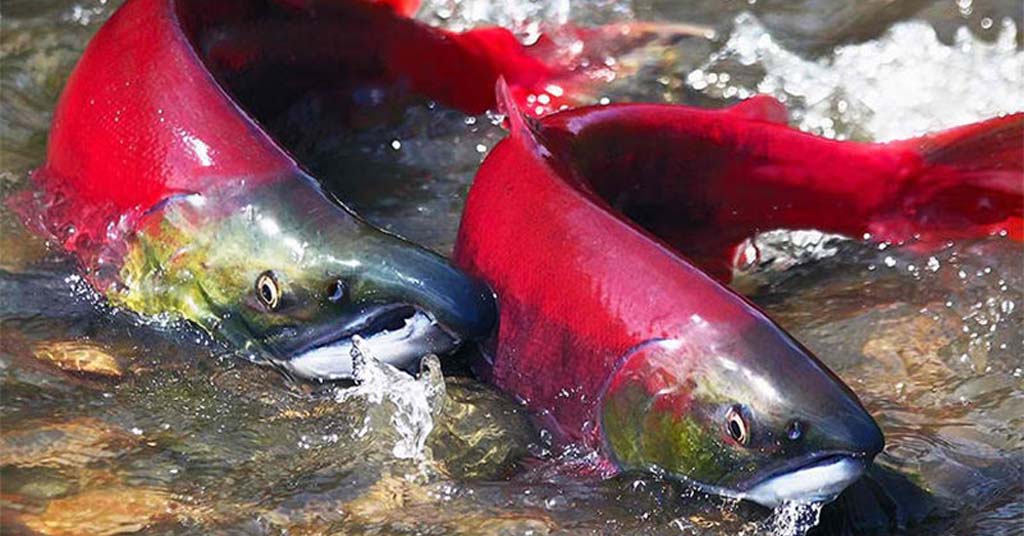
Getting around: Sockeye salmon were once prolific in Oregon’s Wallowa Lake. Their return may get tougher. Photo: USFWS
By Nathan Gilles. February 22, 2024. In November 2023, an unpopular, “last-minute” revision to Oregon’s Fish Passage Rules jumped from the realm of legal speculation and into the real world with the official filing of documents with the state of Oregon for the retrofit of an aging dam in northeastern Oregon.
The dam in question is the Wallowa Lake Dam. Built between 1916 and 1919, the dam provides water for 16,000 acres in Wallowa County. In total it affects approximately 37,000 acres throughout the county, also providing flood control for adjacent properties around the Wallowa River each spring.
While plans for the Wallowa Lake Dam Rehabilitation Project, as it’s being called, are still under review by the state, critics of the proposed retrofit and the unpopular rule revisions have responded.
On Tuesday, a group of seven environmental organizations, the Nez Perce Tribe and the Confederated Tribes of the Umatilla Indian Reservation (CTUIR) filed a motion for stay in the Oregon Court of Appeals petitioning the court to stop the implementation and enforcement of the new revisions to the state’s fish passage rules.
The motion, in effect, argues that the revisions have allowed the dam’s owner, the Wallowa Lake Irrigation District, to avoid making costly changes to the dam that would benefit local salmon populations.
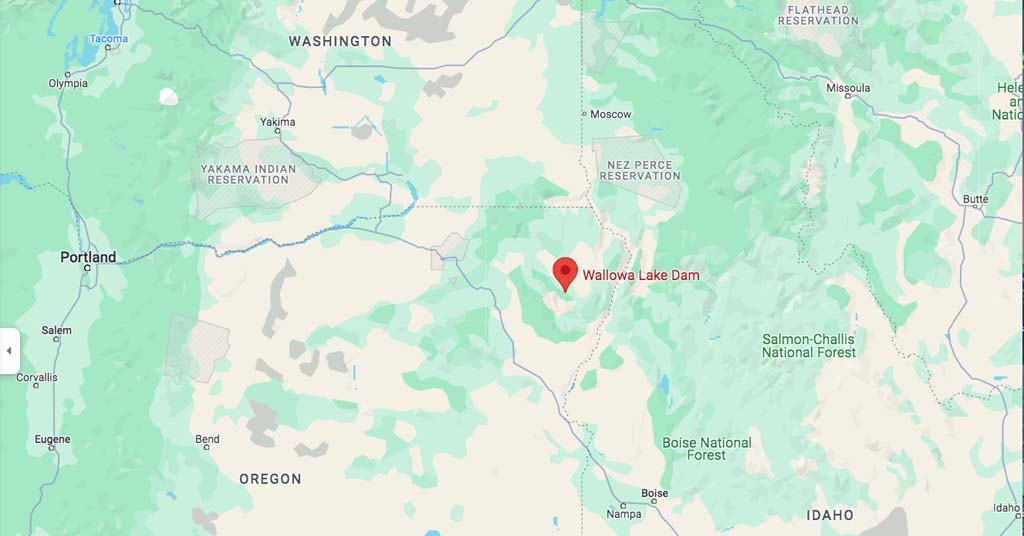
Google Maps
Hoping to either stop or slow the official approval of the dam and concerned that the state of Oregon’s approval of its retrofit might set a troubling precedent for dams elsewhere, the motion asks the court to reinstate an earlier version of the state’s fish passage rules that enjoyed widespread support from Tribes and environmentalists.
The problem with the proposed retrofit to the dam, according to these groups, is that it lacks “volitional fish passages.”
Volitional fish passages are engineering structures, including fish ladders, that allow migrating fish to voluntarily swim past impediments to their migration to and from the ocean.
Volitional fish passages are widely considered to be the gold standard by fish biologists and environmentalists interested in salmonid welfare and recovery.
Instead of using volitional fish passages, the Wallowa Lake Dam project plans to rely on trap-and-haul procedures to move migrating salmonids past the dam, according to plans filed with the Oregon Department of Fish and Wildlife (ODFW).
Trap-and-haul procedures involve people catching migrating fish and moving them, often by tanker truck, to waters above or below dams and other obstructions.
Extended legal battle
Whether or not the current plans for the Wallowa Lake Dam are approved will be up to ODFW.
But ODFW, the recent motion argues, shouldn’t have the legal authority to approve the project because the state agency made changes to Oregon’s Fish Passage Rules to favor trap-and-haul, and it did so, the motion argues, largely in secret.
As Columbia Insight reported last year, ODFW introduced revisions to Oregon’s Fish Passage Rules that were ultimately approved by the Oregon Fish and Wildlife Commission, effectively making them official policy.
These revisions were extremely unpopular with environmentalists, the Nez Perce and the CTUIR, who claimed ODFW’s revisions fundamentally altered the legal definition of “fish passage” to include trap-and-haul procedures.
The effect of these changes, these groups claimed at the time, would be to make trap-and-haul the legal equivalent of volitional fish passages. This, they argued, would make it far easier for dam owners to opt for cheaper trap-and-haul options and avoid costly retrofits for fish ladders and other volitional fish passages.
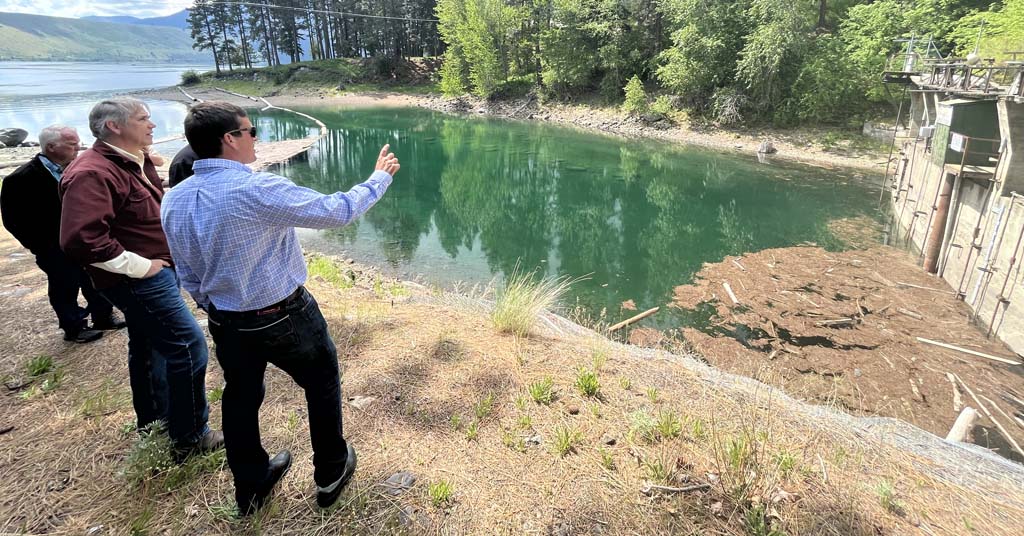
Update update: Ore. Sen. Jeff Merkley (in red) visited the Wallowa Lake Dam in June 2023, posting this photo and writing: “Ron Wyden and I secured $2M toward repair of the Wallowa Lake dam and in support of creating fish passage. I recently toured the dam with the Wallowa Lake Irrigation District, county commissioners, and staff from the Confederated Tribes of the Umatilla Indian Reservation.” Photo: Office of Senator Jeff Merkley
Critics responded to ODFW’s revisions by filing two separate lawsuits with the Oregon Court of Appeals, suing the Oregon Fish and Wildlife Commission and by extension ODFW over the rule change.
The first lawsuit was filed by the Nez Perce and seven environmental groups.
The second lawsuit was filed by the CTUIR.
Both lawsuits claim ODFW’s revisions were significant and were made without sufficient public notice and tribal consultation.
ODFW has refused to release the full list of public documents associated with the revisions, claiming attorney-client privilege.
A decision on the lawsuits filed in August 2023 is still pending.
This is where the motion filed on Tuesday, as well as the Wallowa Lake Dam retrofit and its use of trap-and-haul, enters the picture. Tuesday’s motion builds on the August 2023 lawsuits.
In a nutshell, the motion is a petition to the court to suspend, or stay, the official implementation of the revised definition of fish passage until the court rules on the two lawsuits.
And although the motion doesn’t challenge the Wallowa Lake Dam retrofit proposal per se—or the need for a retrofit at the aging dam—it does call into question the legality under which ODFW might ultimately approve the current proposal.
“The concerns we had when filing the [August 2023] lawsuits are now coming to pass,” said Miles Johnson, legal director at Columbia Riverkeeper, which joined the August lawsuit and the Tuesday filing. “We’re seeing an application for approval under Oregon’s Fish Passage Law that doesn’t include volitional fish passage.
“So we’re asking the Court to stay Oregon’s rules in order to prevent a decision on fish passage that relies on rules that were adopted without adequate public comment and adequate tribal consultation.”
Setting a precedent
In an interview with Columbia Insight prior to the filing of the motion, Greg Apke, ODFW’s current acting Fish Screens and Fish Passage Program manager and Statewide Fish Passage Program lead at the time the revisions were made, confirmed that the proposed Wallowa Lake Dam retrofit does not include volitional fish passages.
“The mode of fish passage that is being planned [for Wallowa Lake Dam] is in fact a trap collection and transport, or trap-and-haul. It is not a volitional mode of fish passage,” said Apke.
Following the filing, Apke said he couldn’t comment on the specifics of fish passage at Wallowa Lake Dam due to ongoing litigation.
[perfectpullquote align=”full” bordertop=”false” cite=”” link=”” color=”” class=”” size=””]“If this project sets a precedent, dam owners will think they can just waive commitments to fish passage.” —Steve Pedery, Oregon Wild[/perfectpullquote]
In a statement emailed to Columbia Insight, Apke wrote: “ODFW advocates for fish passage throughout the state. We evaluate site specific fish passage applications based on the merits of individual applications and proposed project’s alignment with the state’s fish passage policy and Administrative Rules.”
Johnson contends that it will be difficult to challenge the Wallowa Lake Dam project under the revised definition of fish passage should ODFW decide to approve the project.
Steve Pedery, conservation director at Oregon Wild, which joined both the Tuesday motion and August lawsuits, called Oregon’s current legal definition of fish passage “absurd.”
“If this project [Wallowa Lake Dam] sets a precedent, then dam owners will think they can just waive those commitments to volitional fish passage and trap salmon and put them in trucks instead,” said Pedery. “That’s going to lead to some very bad outcomes for salmon and some very bad outcomes for the communities that depend on salmon.”
Bait and switch?
Wallowa Lake was once known for its large sockeye salmon populations.
But this was before the Wallowa Lake Dam’s completion in 1919.
The dam was built without fish passages, which proved devastating to local sockeye runs.
Wallowa Lake is considered a sacred place by both the Nez Perce and the Tribes that now make up the Confederated Tribes of the Umatilla Indian Reservation (CTUIR)—the Cayuse, Umatilla and Walla Walla.
Both groups fished sockeye at the lake and in the surrounding waterways and both currently have fishing rights at the lake tied to their treaties with the United States.
In a declaration filed with the Tuesday motion, Shannon F. Wheeler, chairman of the Nez Perce Tribal Executive Committee, wrote: “I address here the Nez Perce Tribe’s extreme concern that the Oregon Department of Fish and Wildlife (ODFW) is pushing ahead with approval of a cost-cutting ‘trap and haul’ fish passage plan at Wallowa Lake Dam, before this Court can rule on the legality of the in-the-dark fish passage rule revision challenged in this case, at a Treaty-reserved location of extraordinary importance to Nez Perce people.”
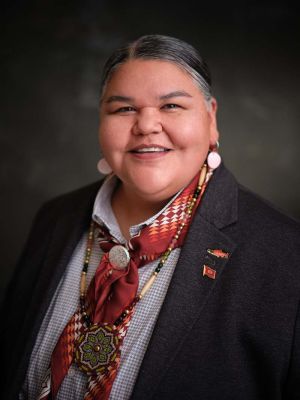
CRITFC Commission Chair Corinne Sams. Photo: CRITFC
Wheeler referenced the importance of Wallowa Lake to the Nez Perce, or Nimiipuu people, adding that the Wallowa Lake Dam’s impact on salmon is “a grave injury to the Tribe’s 1855 Treaty-reserved fishing rights, at a unique Treaty-reserved location, that has never been resolved.”
In a statement sent to Columbia Insight, Corinne C. Sams, member of the Board of Trustees of the Confederated Tribes of the Umatilla Indian Reservation (CTUIR), Chair of the Fish and Wildlife Commission of the Tribe and Chair of the Columbia River Inter-Tribal Fish Commission, wrote: “Wallowa Lake and the surrounding area is a sacred place to the CTUIR. It is a traditional hunting and fishing area of the CTUIR and was part of our seasonal rounds. Many of our ancestors are buried in the Wallowa Valley. We have consistently worked in many forums, including the courts, to defend our rights to the area.”
Sams also submitted a scathing declaration with the motion for stay, writing that the proposed trap-and-haul plans for Wallowa Lake Dam are a “cost-cutting” measure “enabled by the illegal December 2022 rule changes.”
Adding insult to injury, both Sams and Wheeler’s declarations note that the proposed dam retrofit would not have been possible without the Nez Perce and the CTUIR both previously working to secure funding to retrofit the Wallowa Lake Dam under the pretense that volitional fish passages would be added to the aging structure.
“But for the collaborative actions of the CTUIR and the Nez Perce Tribe, this dam rehabilitation project would likely not be possible,” Sams wrote to Columbia Insight. “The efforts of our tribes were crucial in securing the state and federal funding to allow this project to go forward.”
And a different dam, it would seem, is possible, according to Wheeler.
In his declaration, Wheeler noted that the Nez Perce hired its own engineering firm to assess whether volitional fish passages could be added to the dam. The firm concluded that adding volitional fish passages to the dam was feasible.
Oregon Wild’s Pedery also thinks the use of the funds the Tribes helped secure shouldn’t be used for trap-and-haul.
“The public and the Tribes for years have been told the upgrades to [Wallowa Lake Dam] would include fish passage that allowed salmon to swim freely up and down the river. We don’t oppose the upgrades to the dam. We just want the project to actually honor the commitments that were made,” said Pedery.
A representative of McMillen, the Idaho-based structural engineering firm that designed the proposed Wallowa Lake Dam retrofit, couldn’t be reached for comment.
Dan Butterfield, president of Wallowa Lake Irrigation District, also couldn’t be reached for comment.
In the absence of a court ruling on either the motion for stay or the August 2023 lawsuits, the decision to approve the Wallowa Lake Dam project now rests with Apke and ODFW.
Asked about the timeline for approving the project, Apke declined to comment.

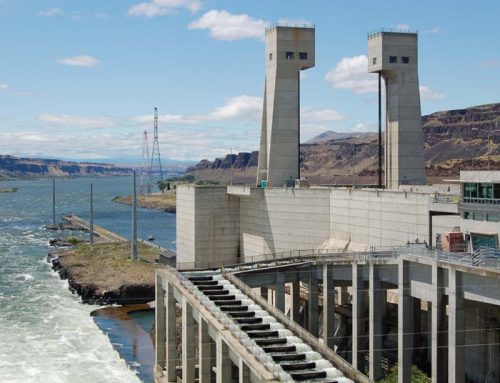
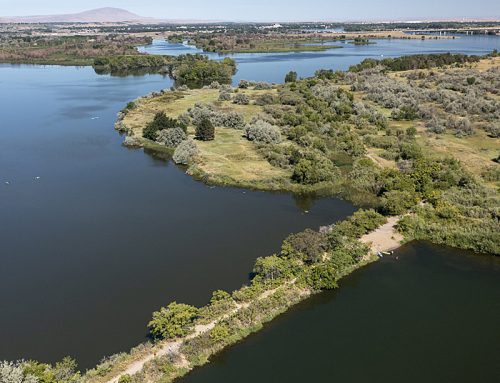
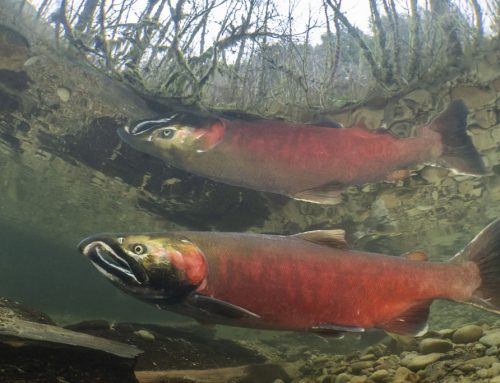
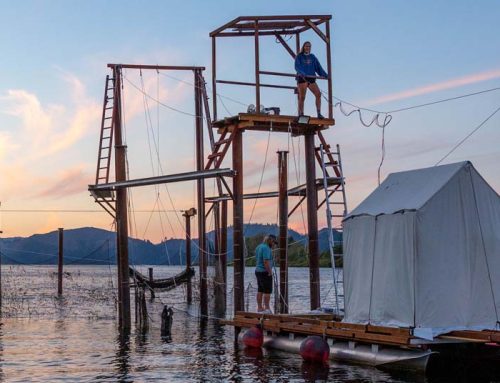
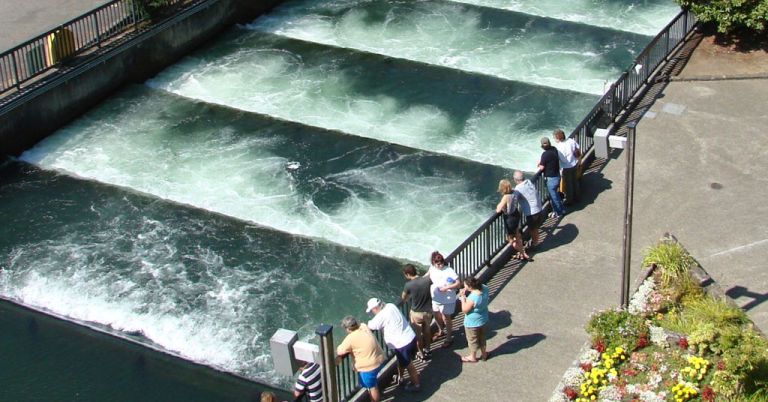
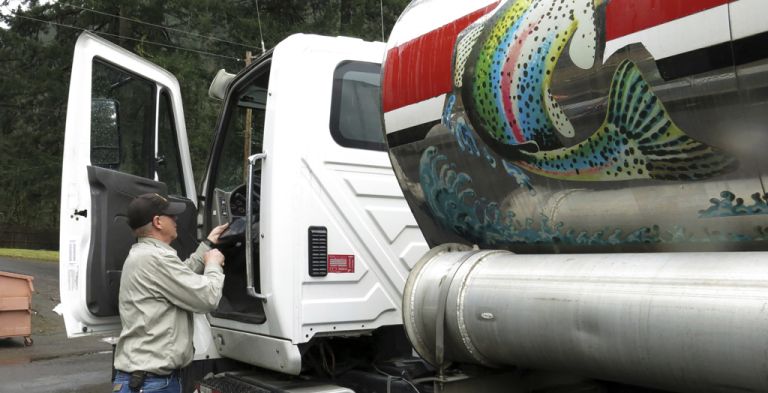
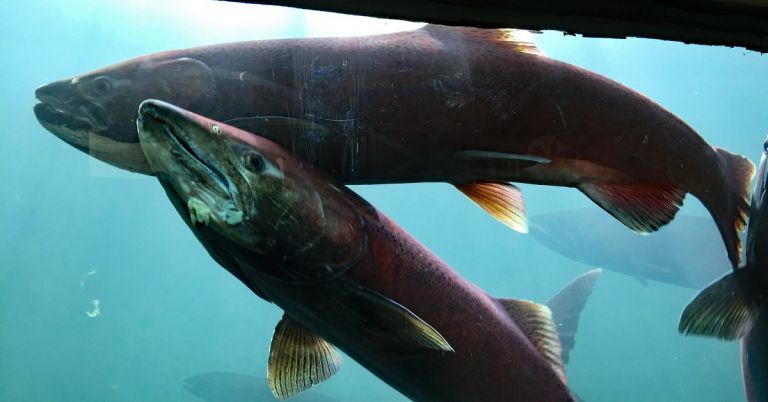
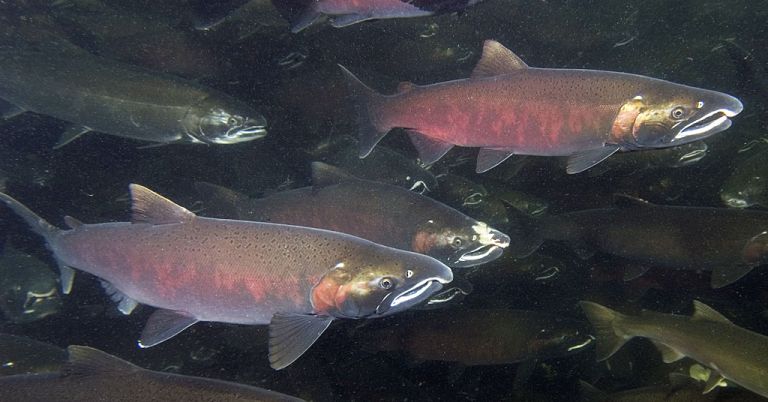


THIS IS NOT RIGHT. THESE FISH NEED TO BE PROTECTED SO THAT THEY CAN SWIM UP RIVER TO THEIR SPAWNING GROUN DS WITHOUT HINCDERANCE.
Restore the natural migration of salmon to Wallowa Lake with volitional fish passage ladders, NOT TRAP AND TRUCK. It’s time to fix what was created for archaic irrigation methods and has been fundamentally wrong in design for over 100 years. Please work together to fund this!
Oh well, “in secret” strikes again. The secret I am always curious about is why no one in the self-styled environmentalist and/or indigenous peoples stakes never bothers to discuss these fish as if they matter to ordinary people.
Hey, you can write about fish lack thiamine, but you can’t write about Earth lacks salmonids?
What specie swims thousands of miles in the open ocean, and hundreds across terra firma to find and then create a place to spawn in a mostly sterile headwaters stream to spawn? People don’t, for sure cows don’t.
Salmon do. Get it correct, or hey lose what is left. People need salmon in spite of Haber-Bosch. They are 3X16 with trace in a sack with scales for in this area, 220,000 square miles.